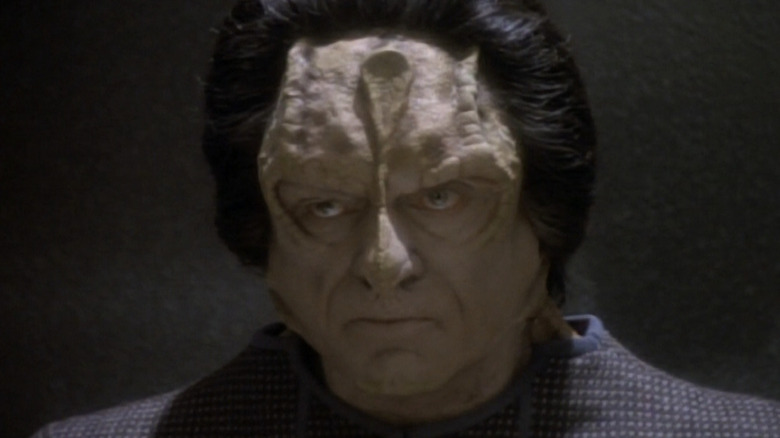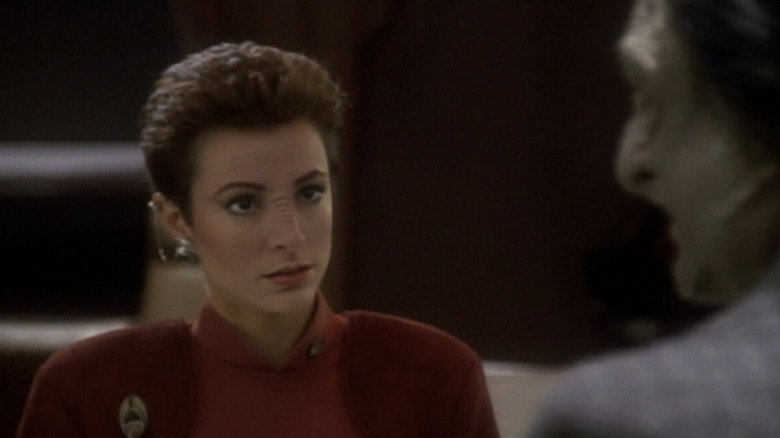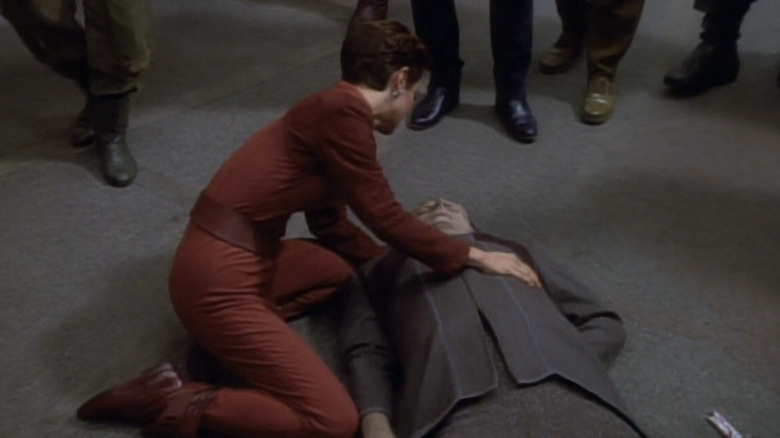One Of Star Trek's Best Guest Stars Tried To Force A Major Rewrite
Harris Yulin is one of the most prolific character actors currently working in film and TV. If you've been watching any television since the 1970s, odds are you've probably seen his face in something. Yet, one of his most memorable roles is also his least recognizable, since his face was buried in make-up. That would be a reference to the "Star Trek: Deep Space Nine" episode "Duet," where he played a Cardassian named Aamin Marritza.
"Deep Space Nine" is set on Bajor, a world previously occupied by the Cardassian military. The series' primary Bajoran viewpoint comes from Major Kira Nerys (Nana Visitor; read our interview about her "Star Trek" experience here), a former resistance fighter still scarred by her people's years of subjugation. That backstory weighs heavily on "Duet" (written by Peter Allan Fields).
Like most "Star Trek" shows, "Deep Space Nine" had a rocky first season. The two episodes in that batch that everyone recommends, though, are the pilot "Emissary" and "Duet." (/Film ranked "Duet" one of the best "Deep Space Nine" episodes and we are not alone.)
In "Duet," Marritza (Yulin) arrives on Deep Space Nine and Kira discovers evidence he was a clerk at Gallitep, one of the Cardassians' many concentration camps for Bajoran prisoners. She demands he be tried for his role in the occupation. When the heroes dig deeper, it looks even worse; based on photographic evidence, this Cardassian is no mere clerk, but the camp's commander Darhe'el.
The prisoner confesses, acting unrepentant and proud of his bloody work. Then inconsistencies pile up — chief among them, Darhe'el turns out to have died in his sleep six years ago. The Cardassian they're holding is Marritza the file clerk. His guilt over not doing anything to stop the torture at Gallitep has caused him to deteriorate mentally; he believes the only way he — and Cardassia — can achieve atonement is for him to play the part of Darhe'el and give Bajor the trial and execution that's otherwise out of their reach. Kira forgives him and refuses to help his plan: "Enough good people have already died. I won't help kill another." While being escorted out, though, Marritza is stabbed by a vengeful Bajoran, leaving Kira to cradle him as he dies.
According to both "DS9" producer Ira Steven Behr and "Duet" director James L. Conway, Yulin was so against this ending that he lobbied for rewrites despite being a mere guest star.
Harris Yulin's experience acting on Star Trek: Deep Space Nine
Behr, recalling the experience of working with Yulin, explained in a 2017 tweet: "[Yulin] b**ched and moaned about [his role] demanding that it undergo a major rewrite. Not a word was changed. Funny old biz."
This stunned me when I first read it. The script for "Duet" is so sublime, as is Yulin's performance. Acting as Kira's foil, he helps bring out the best in Nana Visitor too. The interplay between Kira and Marritza, a determined woman standing outside a cell talking to a man playing mind games as he sits inside it, evokes "Silence of the Lambs." Visitor and Yulin are nearly as good as Jodie Foster as Clarice and Sir Anthony Hopkins as Hannibal Lecter were.
The part of Marritza is a dramatic feast that day player jobs on TV rarely offer. When "Darhe'el" brags about his war crimes to Kira, Yulin is totally convincing as a power-drunk tyrant. From the way he describes his pride in killing Bajorans, in having control over life and death and then always choosing the latter, you feel like you're watching the Devil himself. Then, with hindsight, you realize Yulin isn't playing a hammy villain, Marritza is. He's trying to convince Kira that she's right about him being a monster — just like Yulin, in turn, convinces us in his final scenes that he's a man who'd rather die than keep on living as one of the guilty.
Notice how his Darhe'el facade finally collapses while denigrating himself and his cowardice, describing how (in third person) Marritza covered his ears and cried himself to sleep every night, terrified by the screams he could hear from his bunk. Watching him, one feels that he never stopped hearing those screams after leaving Gallitep, so he stopped covering his ears.
Hearing that Yulin seemed to "hate" the episode? It stung me with disappointment. Then I happened on Conway's earlier 2012 interview with Star Trek.com. His account still fits with Behr's memories of "b**ching and moaning," but according to Conway, it wasn't because Yulin hated "Duet" at all:
"[Yulin] didn't like the ending of ['Duet']. He got so invested in his character that he didn't want his character to die at the end. He was trying to justify it and have him somehow survive, which almost never happens on a television show. The guest star never starts trying to change a script. He did, but mostly because he was so invested in the character."
Yulin's complaining seems to have come from his passion for the "Duet" script, not lack of it. I think both Behr and Conway's accounts are the truth, just remembered differently. Yulin wanting the ending changed so Marritza lived does fit the demanded "major rewrite" Behr recounts. Plus, since he was stepping out of line and above his rank to get the script changed, Behr might've remembered that as him being difficult to work with. (Behr did make the tweet 24 years after "Duet" first aired.)
The Duet of Star: Trek Deep Space Nine needed to be sung
It's tempting to imagine what might've happened had Yulin gotten his wish. Could Marritza have become a recurring character like his fellow Cardassians Dukat (Marc Alaimo) and Garak (Andrew Robinson)? Was he right to object? The episode's judgment is that Marritza does not deserve to die for his crimes of inaction, but did he need to die narratively?
The ending of "Duet" is clearly using the perennial theme of revenge stories: the cycle of hatred. The two final lines spell this out in flashing neon-font; Marritza's murderer Kainon says that him being a Cardassian is enough reason to kill him. Kira says that no, it's not, even though before this episode she felt exactly the same as Kainon.
In the 2020s, however, we've become more skeptical of stories that suggest the oppressed lashing out makes them as bad as their oppressors. People with power who abuse it are rarely punished these days, and I think that's made us all less forgiving people than we were in the 1990s.
"DS9" largely uses the Bajoran occupation as a Holocaust allegory. "Duet" is one of the preeminent examples of that. The episode is even frequently cited as a spiritual remake of Holocaust trial drama "The Man in The Glass Booth," a play and later film written by Robert Shaw (mostly known for playing Quint in "Jaws"). Shaw's story is about Arthur Goldman, a Holocaust survivor so mentally traumatized by the atrocities he witnessed/experienced at Auschwitz that he now believes himself to be the Nazi colonel Karl Dorf. When the Israeli government discovers "Dorf" in hiding, he's brought to trial, only for the truth to be revealed in the denouement.
A comparison I can't stop thinking of is "Duet" and 2023's "The Zone of Interest." The film centers on Auschwitz commander Rudolf Höss (Christian Friedel), who lives with his family in a pretty villa right outside the camp, aware of what's going on but choosing not to look too closely. The sound mix in "The Zone of Interest" features faint screams and fires of a furnace coming from just offscreen — so faint that watching the movie teaches your brain to tune them out, just like the Höss family did. Just think back to Marritza's description of seeing and hearing horrors, but not acting to stop them.
Does "Duet" err, as some have argued, in suggesting forgiveness is the most desired ending to atrocities? Or does Kira choosing to forgive Marritza, without him asking for it or even forgiving himself, reaffirm her as the story's center? Was an ending right out of "Pedagogy of the Oppressed" too neat a final note, or a reminder that collective punishment (especially of those who repent) is a flawed method of achieving justice?
The themes and questions posed in "Duet" don't come with easy answers — I don't have them — so it's extra important to ask and consider them. If there's a most productive lesson in "Duet," it's to remember that even righteous anger can be damaging.


